July/August 2019
Gentle Malawi
Enjoying a quieter, more relaxed pace in Northern Malawi
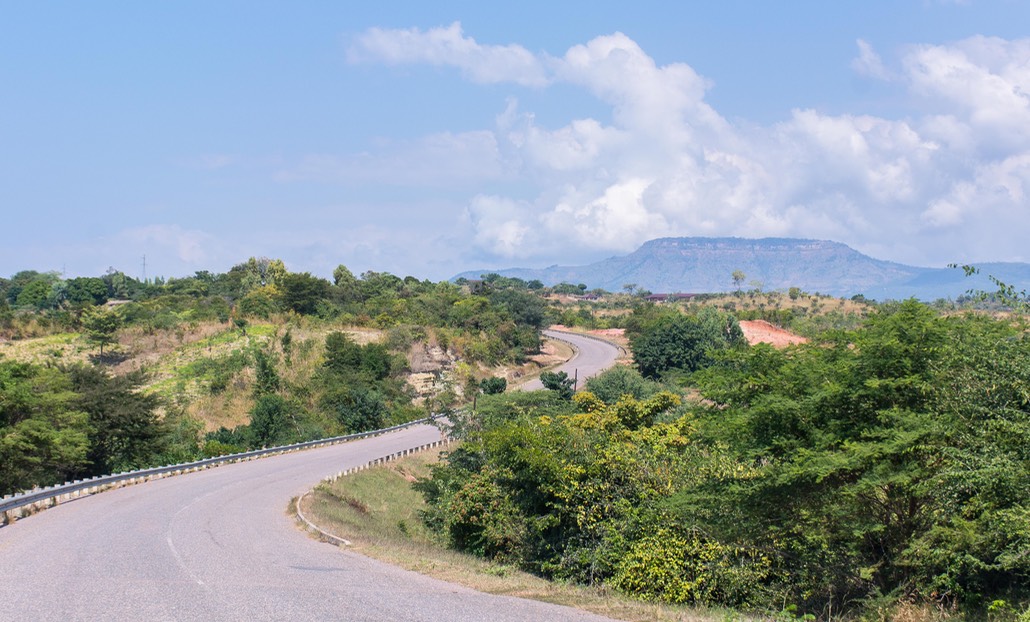
Everyone who travels the way we do really likes Malawi. Much of the country sits beside huge Lake Malawi (aka Lake Nyasa in Tanzania, and Lake Niassa in Mozambique - go figure), which is nearly 500 kms long and is the third largest lake in Africa. It’s beautiful, peaceful, and rural; you traverse the country north to south or vice-versa, with the mountains on the east side of the lake forming a lovely backdrop to the wonderful views over the water. From the traveler’s viewpoint it is generally less crowded with tourists than other African countries we’ve visited and, in part as a result, noticeably less expensive. So why is there less tourism here, and why is it more reasonably priced than its neighbors? We’ll get to that later, but don’t lose the thought.
Prior to arriving in Malawi, I had read a very interesting book, The Boy Who Harnessed the Wind, by William Kamkwamba; I re-read it while we were here. It is the story of how a young man was able to bring electricity to his small community. Not only is it a terrific tale, but there is a tremendous amount of information on rural life in Malawi today; how they cope, the effect of drought, the roles of various members of the community, religious beliefs, etc. It’s a great read, and really helped me understand what was going on around us as we spent time here. I really recommend it, and the story has also been made into a movie. Go find it!
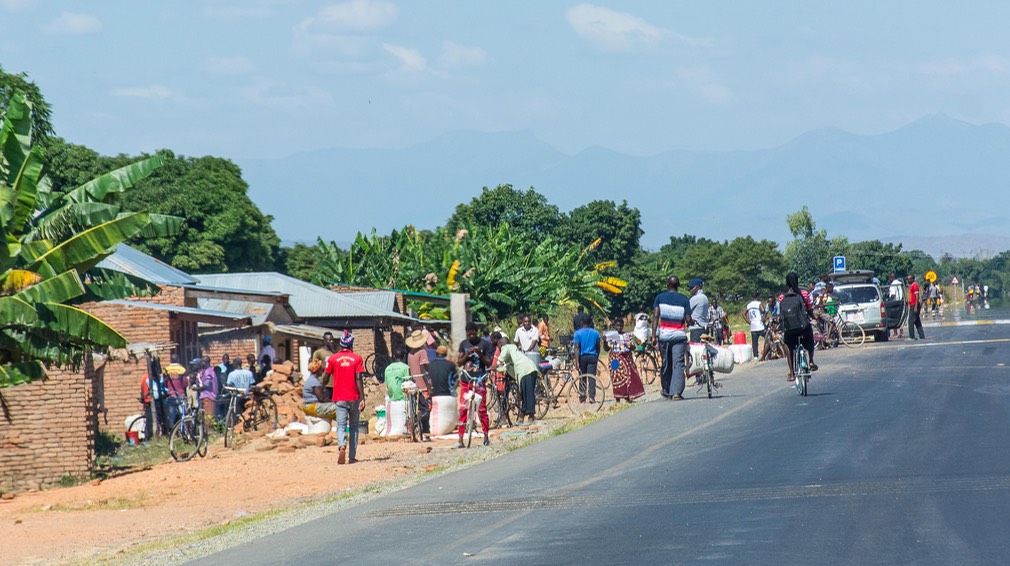
We entered Malawi at the top, at its northernmost border, dropping south out of Tanzania. We were given 30-day visas, but asked where to go to get extensions, as we suspected we would be here for a bit. Lilongwe (the capital) was the answer, but we knew other large towns would also be able to handle the problem.
Starting down the road we were struck anew by the pleasures of a paved road — no dust! Smoother! Easier to pass! All that would turn out to be at least partly true during our time in Malawi, but for the moment we just were quite happy to be here. The countryside was lovely, and for awhile continued the “banana belt” environment we’d been enjoying back in southern Tanzania. The bananas were piled along the road, tea plantations were common, and field crops were everywhere. This was some of the prettiest countryside we’d seen in quite a long time.
As we were leaving the border we’d been cautioned by the local police that Karonga, the first town of any size we would come to, had in recent days been “enjoying” some demonstrations. None were scheduled for today, but be careful anyway. Okay! We’d been looking forward to getting to Karonga, for a couple of reasons. We needed a new SIM card, for starters, along with some groceries. Also, Karonga has a kind of interesting museum. It seems that way back when, some dinosaur remains had been found in a field nearby; the museum had been constructed around the skeleton.
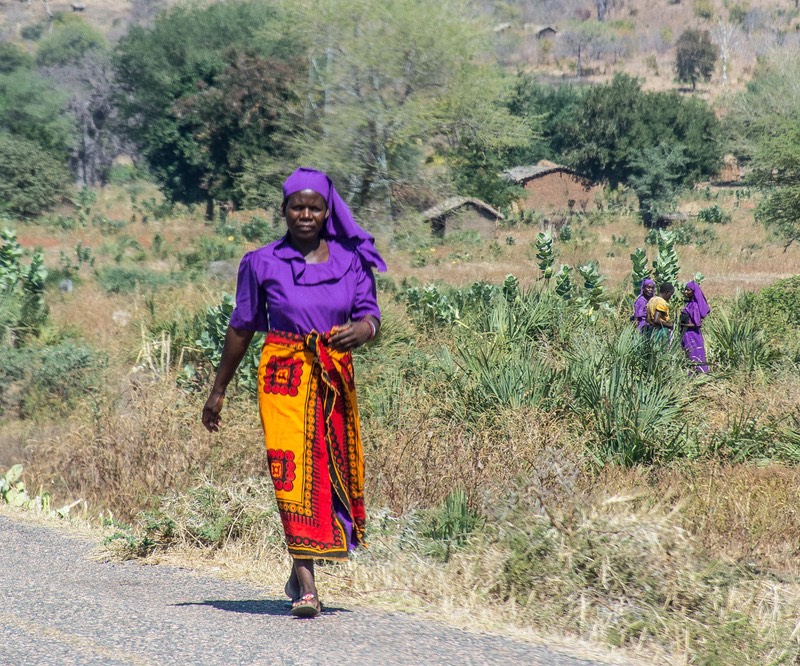
But frump! Even though it was a Friday, the museum was closed and a building on site had been burned down; the park across the street was full of junk, and army trucks were on patrol; the stores were all closed; the town had been shut down. We struck out on all fronts — except for the ATMs, which were plentiful and happy to share their goodies with us. The availability of ATMs was to be a real plus during our time in Malawi for a simple but rather odd reason. The biggest currency note in Malawi is only 2,000 Kwacha, which is only about $2.50 US. Why this should be so we don’t know, but the result is that most of the ATMs we used in the country are limited to 80,000 Kwacha or just over $100 US. This amount makes for a very fat wallet, but doesn’t last all that long; resulting in frequent need for the next cash fix.
We’d been planning to move further on down the coast anyway, so on we went. It was July 5, and the 6th was said to be a countrywide holiday so we knew there wasn’t any point in hanging around Karonga. Disappointingly, as we continued to drop in elevation our lush fields and banana trees were now giving way to the more typical dry fields with scrubby trees, baobabs, and little else. It was quite apparent that once we stepped out of the shadow of the Tanzanian Highlands, we’d left the breadbasket behind.
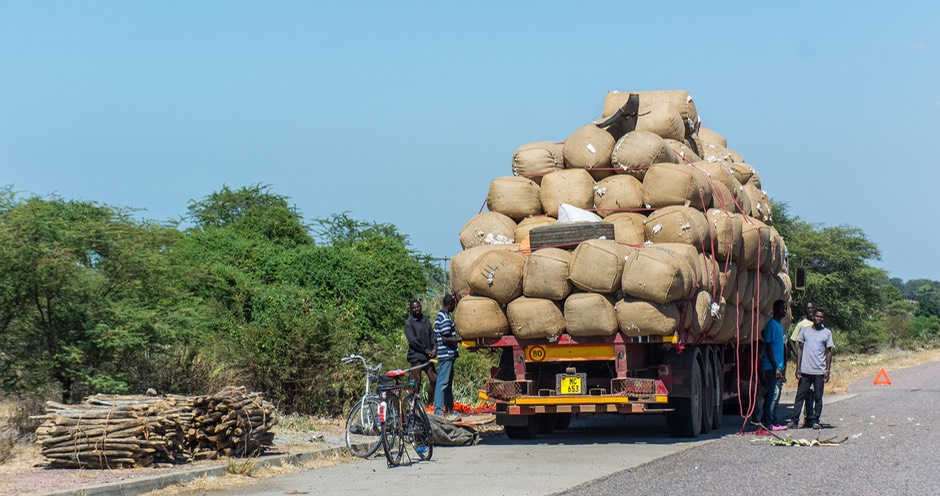
As we started south we were seeing more and more people along the road with very few empty stretches. We enjoyed the sight. There was the usual stream of people hauling wood and charcoal, but now there were also groups of people who seemed to be out for a stroll, both men and women. This has continued all through the country, particularly on Sundays. The women especially wear brilliantly colored skirts, sarongs and dresses and the roadside parade is really endlessly entertaining.
We were still seeing goats and cows along the roadside, but now lots more pigs. No tuk-tuks now and far fewer motorbikes, but tons of bicycles. A new sight for us was trucks piled to the sky with baled cotton. We also saw it piled on the backs of bicycles and motorcycles. Something else being piled on the back racks was animals — alive or dead, all being carried off to or from a market. We even saw a goat draped across the driver’s back, looking a lot like a backpack. Everything gets carted around, one way or another.
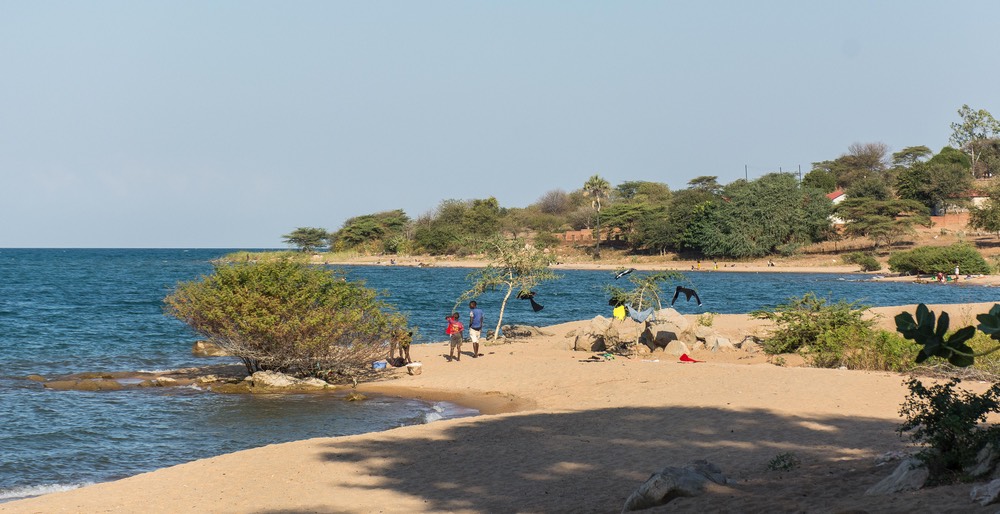
Our destination was roughly another 25 kms down the road to a really interesting place called the FloJa Foundation & Lodge, near Ngara. This was a really interesting spot, and a lovely place to visit. The foundation runs a school and offers other support for the local community. It’s owned by a Dutch couple, with the foundation center in The Netherlands. The couple who are the current managers have been there for three years, and are terrific. The facility provides breakfast and lunch for the children, supports the teachers (locals), helps with food production, etc. There are many such foundations in Malawi, most of them aimed at helping children get a better start in life.
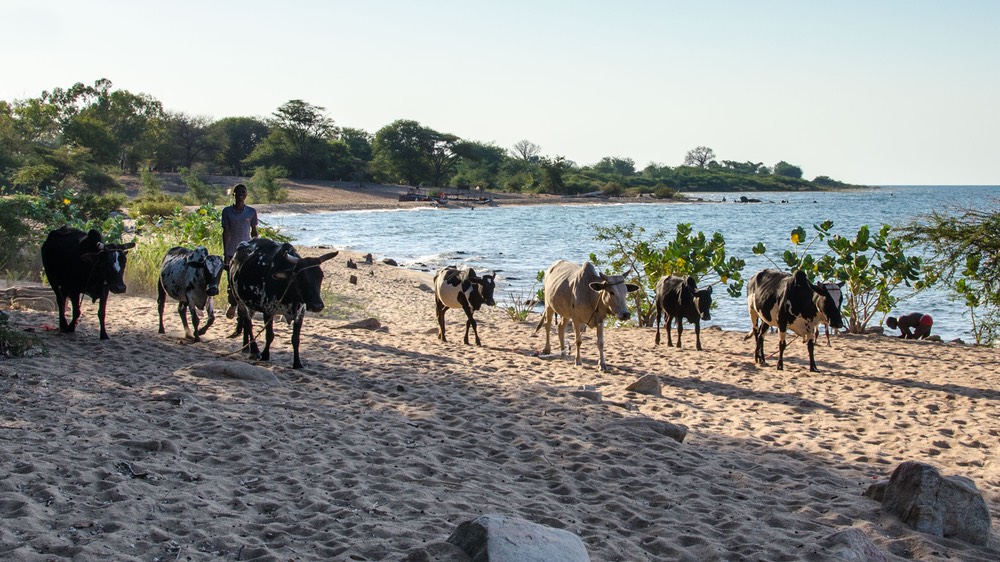
Since it was a holiday weekend, there was no school being held, but kids were around, helping with things and generally being kids. It was a cheerful, happy place. The camping area is located right on the lake, among baobab trees. We spent three great days, watching the fishermen out on the water, and the women on shore — washing children, clothes and themselves. Every morning the kid tending a couple of pigs brought them to the water for a drink while he washed them down; and twice a day a group of cows passed by along the beach, heading out in the morning and then back home before nightfall. It felt quiet, natural, casual and very local. Idyllic.
We would have stayed forever, but since we had been unable to shop in Karonga, by now we were pretty much out of food. The managers helped us out, with homemade yoghurt, bread and eggs from their chickens. But eventually we would need to get to a store. We were finding that in Malawi, groceries could be hard to come by. Seasonal fruits and vegetables are easily purchased along the road; and if we were braver we could have bought a live chicken (or even a goat), but other basics were in short supply. So on we went.
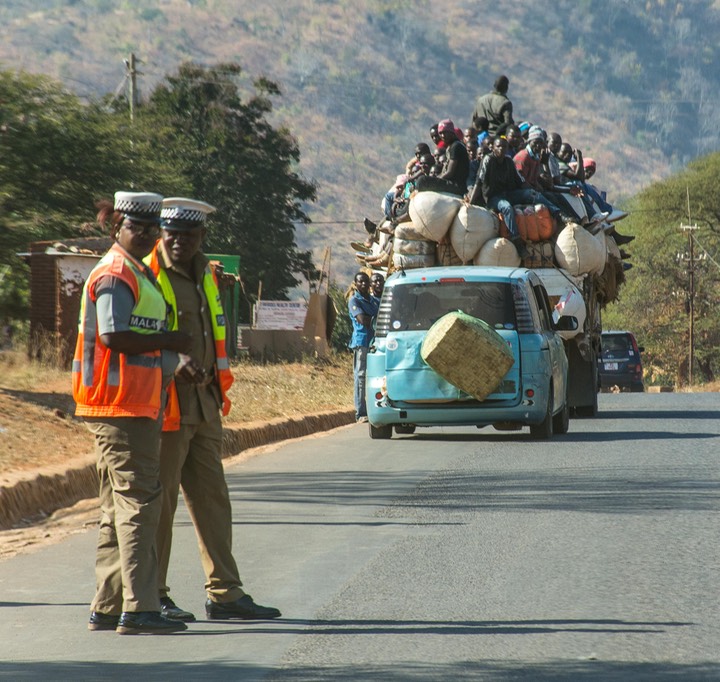
Driving along, we were noticing that the lakeside communities seem to be very closely tied to the water. Everyone swims, bathes, washes their clothes, takes dugouts out to fish, gets buckets of water, and generally stays close to the water. Many of the animals are not closely watched; they wander along the shore during the day, and when the sun goes behind the hills they head for home. From time to time we’ll hear a voice singing as the work carries on.
We encountered numerous police stops along the highway, but unlike Zambia or Tanzania, we didn’t see any radar guns and never felt the stops were ‘speed traps’ or any other form of harassment. The police would sometimes just wave us on, or might ask to see our insurance paperwork, or would just want to chat. An example of the latter were the policeman (a couple actually) saying “we need this truck; when you are done with it send it back to us” Or, again, the officer who, after looking inside the Tiger, said how much he’d enjoy a ride up to the next city; we knew he wasn’t seriously asking for a ride, but was just showing his admiration for the Tiger.
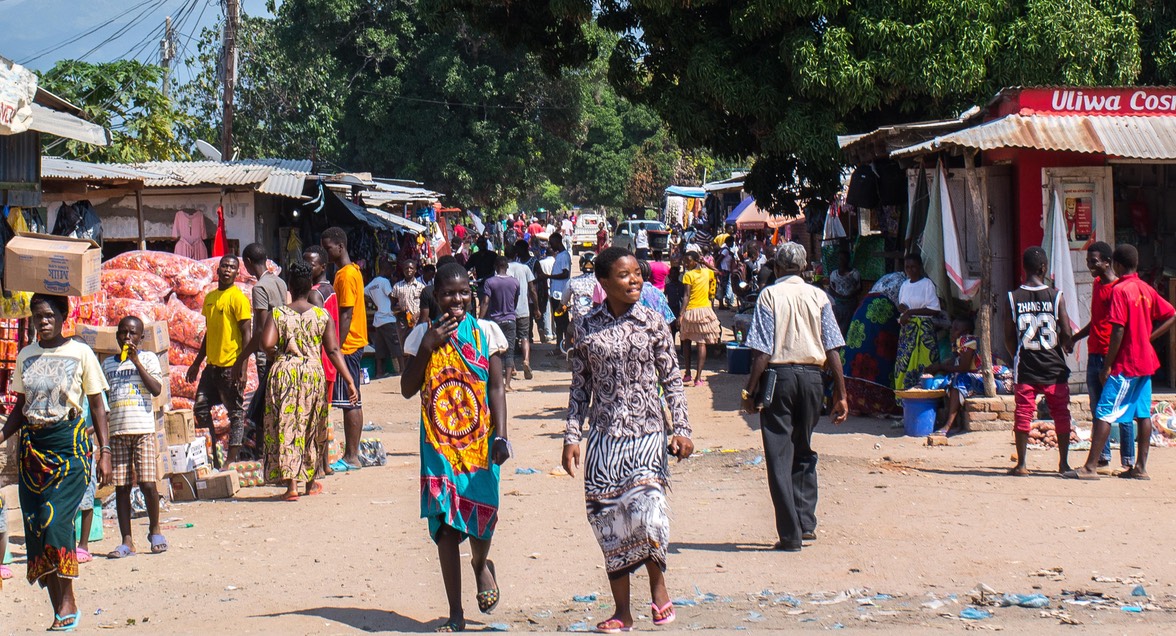
It was at about this point in our African travels that I decided we needed to boil all our drinking water. We have a very good filter system in the Tiger, and it has been superb over the years. But we’d both picked up intestinal problems back in Zambia, and Rick was still really feeling the effects. Maybe boiled water would help. This added complications to our daily routines, of course, and I cannot say for sure whether the effort was worth it, but Rick started to perk up and within another week was pretty much back to normal. We kept up the procedure for about three weeks, but have now stopped, and so far, so good.
Our next planned destination was Livingstonia, which is a town up on top of an escarpment where David Livingston and other missionaries had relocated following serious problems with malaria down by the lakeside. The views from there are said to be wonderful, but we’d been warned of the difficult road to the top. We started off, but decided pretty quickly that we didn’t want to try it; those rocks were just too big for our comfort, so we went back to the highway and continued on our way.
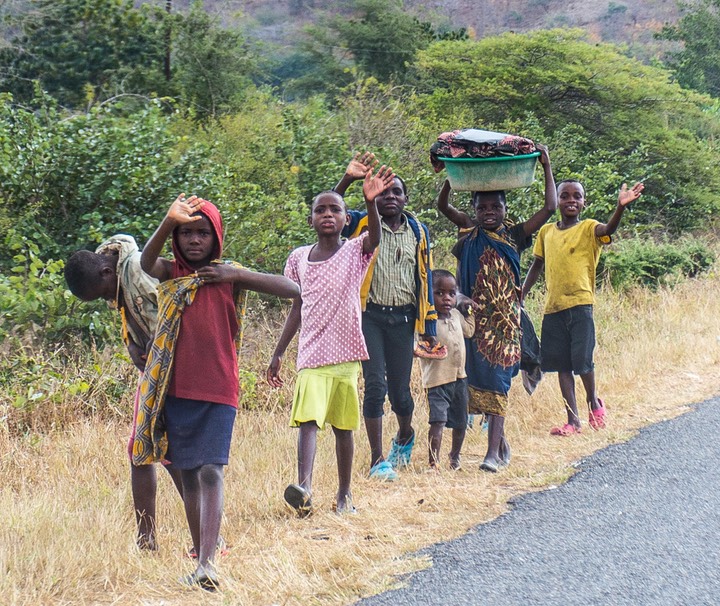
A bit further south, we found our next adventure — a trip into the mountains west of Lake Malawi, to explore the Nyika Plateau and Nyika National Park. A good jumping off place for this trip is the nice little town of Rumphi, along the South Rukura River. We stopped for the night at a funky little homegrown site in town. It’s called the Adios Lodge and Camping, where we were loved and catered to and just had a super good time. It was very casual, we were the only campers; I think maybe there was a total of three spots on the site. Run by locals, it didn’t have a lot going on at the time; maybe that’s why we got so much attention. The cook, Alick, was our buddy; we wanted to have dinner in the restaurant and he had no electricity. But did he explain this would be a problem? No, of course not. He fixed all the parts of our meal separately over a charcoal fire! We ate by candlelight, the food all came out together, and was quite yummy; the scene was dark and romantic. I particularly loved the Chicken Adios! special, and Rick had a quite nice pizza.
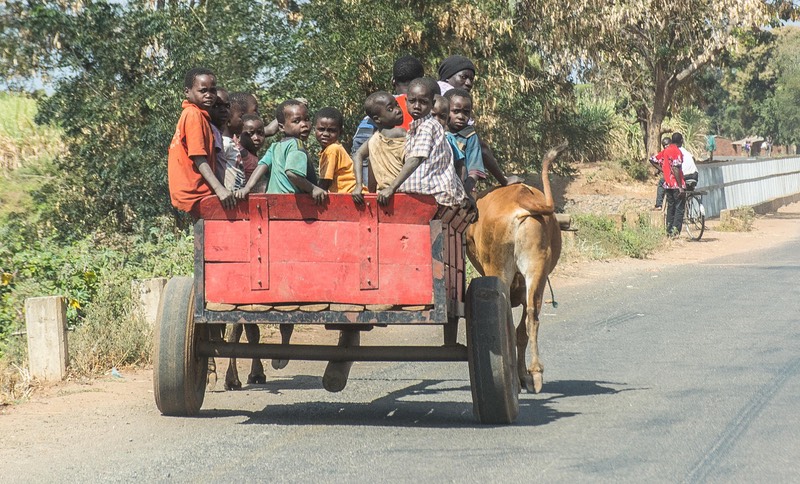
One of the young guys helping to run the place showed us his vegetable garden. He’d been given permission to use some of the owner’s land for this project, and get water from the pump — a many-bucket project that had to be repeated several times a day. “Every time, all day, every day.” But he was growing food he could take home to his family, and was doing the watering between his chores. Each of the employees we came into contact at Adios camp was just so very gracious and caring and nice to us it was actually sort of humbling. Our very positive impressions of the people of Malawi continued to grow during our time in the country.
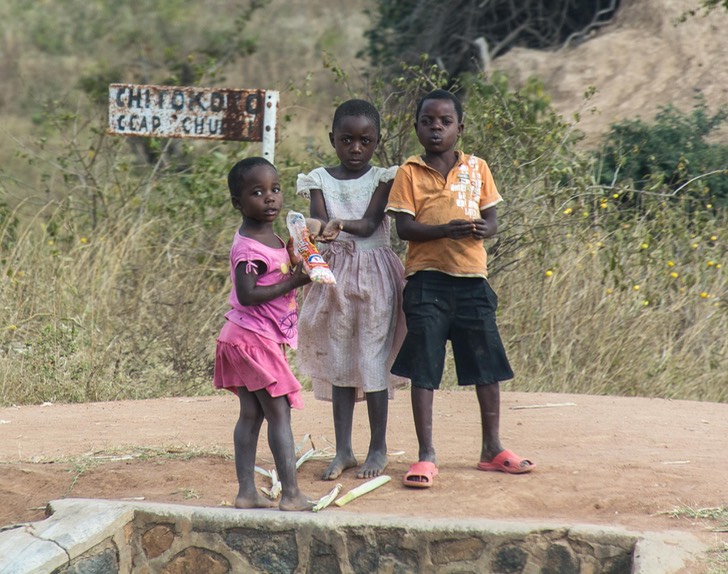
A few days later, after our trip into Nyika NP, we came back and spent more time at the Adios camp. Got to talking to some of the crew. They are bitter about the lack of government help in getting ahead. This fellow told us he’d gotten an excellent education in Malawi, but after that had nobody to turn to. He would like to be able to buy some land, but doesn’t see it happening. We are seeing this everywhere — schools abound, but you can’t see a future, as opportunities for good jobs are simply not present. On the morning we left, they all came over to say goodbye and Alick gave us a box of rice as a parting gift.
But between our two stops at Adios, we went off to Nyika. We had our eye on two places we wanted to explore. The first was before we headed up into the mountains of the Plateau — the Vwaza Marsh Wildlife Reserve. At a lower elevation, this area was described as a really great place to go hang out next to a small lake, and being filled with animals and birds to enjoy. So we left Rumphi, heading east on good road… well, good road for about ten kilometers, then it turned to dirt, rocks, ruts, and other delightful goodies. This would continue until we’d been up to Nyika and returned. So be it.
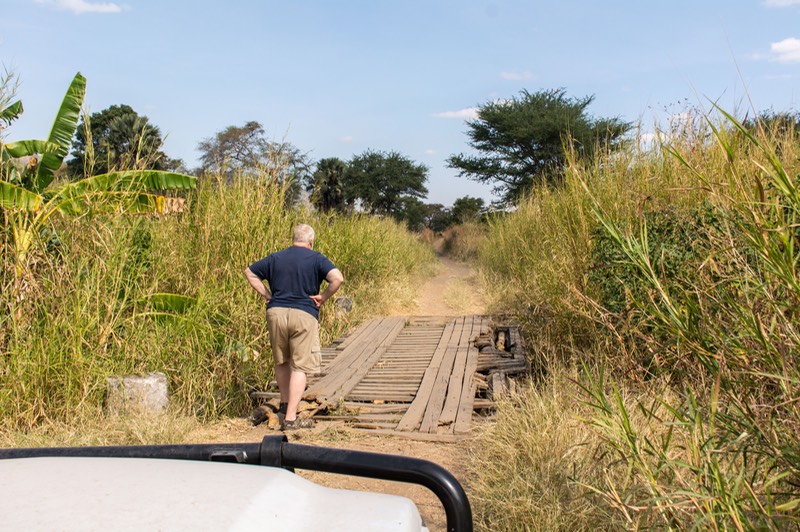
We’d gotten directions on where the turn off to Vwaza was located. We found the turnoff as described and were able to confirm it was the correct one with some locals at the junction. So we headed off in hot pursuit of marsh-friendly animals and a quiet camp by a lake. Well… it was not to be. We did drive through splendid high grass, very marsh-ish, and did arrive at the described small bridge that would lead us down the last of the road to the Reserve. But (a very large BUT) this bridge was not prepared for a Tiger to cross! Rick got out, looked at it, walked out on it, jumped up and down a bit, frowned, and we knew we’d not be able to cross.
Well, phooey! We knew we were very close, but no cigar. Quite discouraged, we backed up a fair distance (the grass was higher than the sides of the truck), found a little side road that led to a cluster of buildings, and drove in, hoping for a spot to turn around and maybe some advice. Well! Had we known the pleasures that lay ahead we wouldn’t have felt so glum because it seems we were in for a real treat.
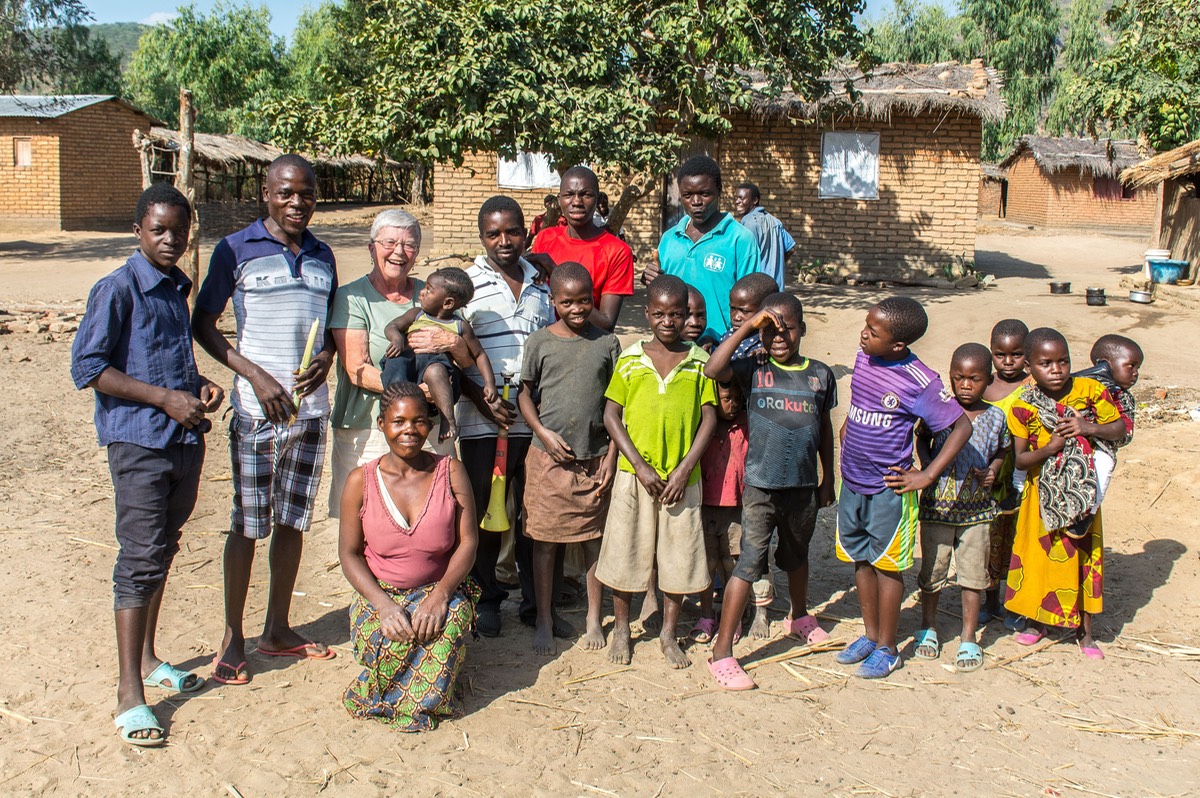
(There’s a long story we know from one of our movies (Charlie Wilson’s War) that uses the line, “We’ll see, says the wise man”. We won’t regale you with it here, but the gist of the story is that you never know what is a good or a bad thing that happens; you just have to wait to see what develops next.)
So we stopped in an open area in the village and the good folks crowded around; this means adults, children, babies, chickens and goats, and I think maybe even a pig. They were lovely to us. Said they’d be happy to guide us in on foot; or try and reach the ranger out there to see if someone could come get us; or they’d show us another route (but that had a tiny bridge too).
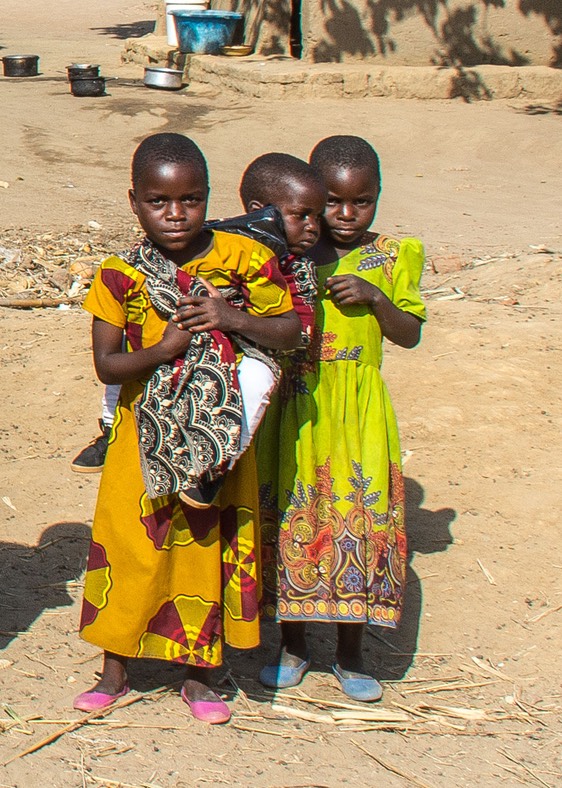
After a bit Rick asked if he could take a picture of all of them with Kathy. At this they were very excited and the crowd got even bigger. We started gathering together and suddenly, a man came running over carrying a baby, which was put in my arms to hold; her mother knelt at my feet.
It was a wonderful time. We laughed and giggled and the baby wanted to go back to her mother and it was all great and we hated to leave. Finally, we headed on back up to the main road; we found out later that while we’d followed our directions properly, we’d gone beyond the turn-off that most people take… the one without a really bad bridge! Ah, well. We’re calling this adventure “Half a Kilometer Short of a Marsh” and thanking the wise man for his always sage advice.
As an aside, we continue to be overwhelmed by the generosity and good will we receive from the people we meet as we travel along. They are very confident, open and friendly, coming up to you and greeting you as you walk along. Malawi is one of the poorest countries in Africa, and yet the people stand tall, speak graciously, offer you assistance, and want to chat with you about where you come from and where you are traveling to. The women (and men) walking along the road with stuff on their heads have a very purposeful, graceful, swaying rhythm. They seem to develop it very early on; you see small children already doing it. We admire the people of Malawi.
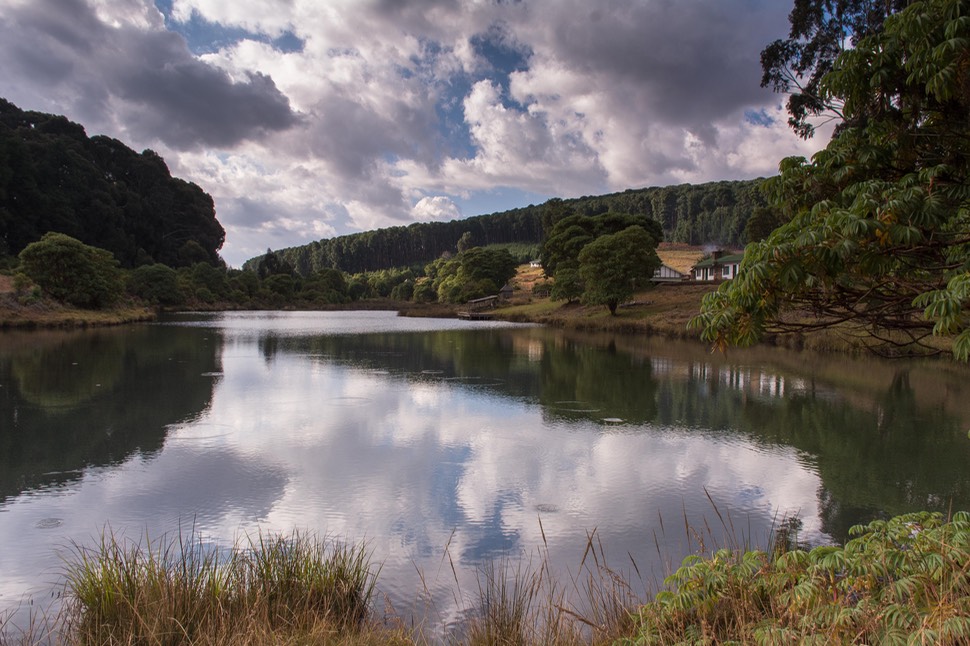
Leaving this delightful village, on we went, returning to a large turnout we’d spotted in passing to get off the road a bit for the night. Following a peaceful night we drove on up to the Nyika Plateau and into the park. The road was unfriendly, to say the least; but it did get better after we entered the park. This is a very nice area, up to almost 2400 meters in elevation. The views are typically of a wide open saddle and rolling hills, and some think it looks a bit like the highlands of Scotland. There are supposed to be elephants here; they even had a sign warning vehicles to keep an eye out for them on the road but given our luck, all we saw was their dung along the roadside. All in all, and discounting our side trip to the marsh, it took us about 5 hours in from Rumphi to the park lodge and camping area, a distance of just about 110 kms (roughly 70 miles).
In stopping at the lodge to get registered for our night in the park, we’d admired the setting for the facilities there. The lodge sits on the edge of a beautiful little lake, tucked in a quiet spot in the trees — definitely the Scottish Highlands, or perhaps the Lake District in England. Truly gorgeous, and clearly established long ago.
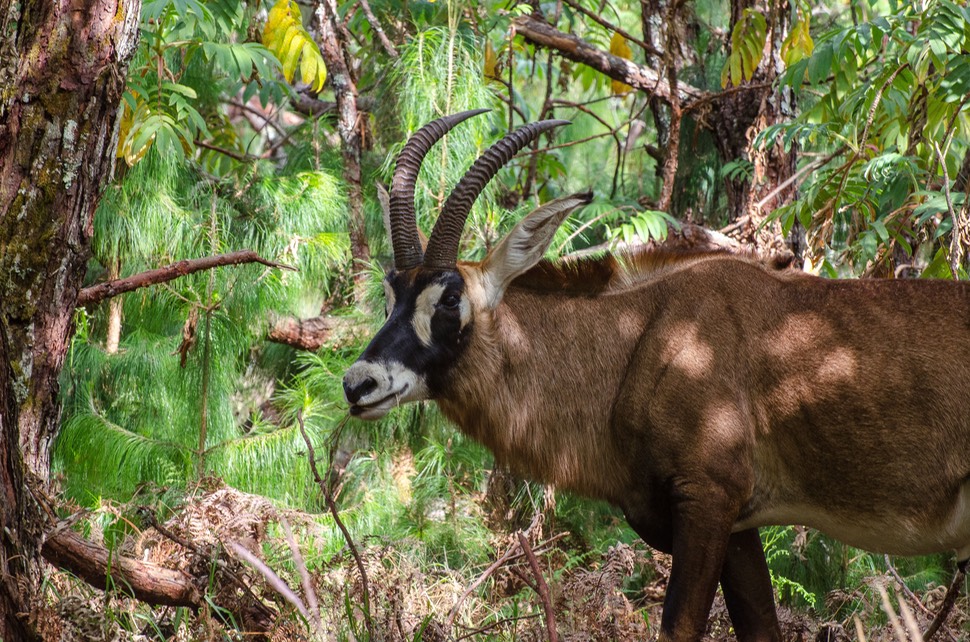
There is a very nice setting for the camp spot, overlooking the high plains. There’s game in the area: nyala, roan antelope, zebra, and some other little critters we think might be ribi antelope; not sure. We took a sunset game drive, and very much enjoyed it. Oh yes, and apparently we slept right through the sound of arguing leopards during the the night; quite close to the campsite, it seems, or so we were told by other campers in the morning.
We debated maybe staying a second night and doing more wandering during the day. But when we’d talked to the folks at the lodge, most of the roads we’d not driven yet had bridges that wouldn’t support vehicles over 4 tons. Since we’d not be able to see much more in any case, we decided to head on back down to Rumphi and the Adios.
Part way along we came across some fellows with an engine problem; we gave them a ride to the park entry gate, where they’d arranged to have someone meet them. Doesn’t happen often, but Kathy rode in the back; a bumpy, rocky ride that was made worse by sitting on the living room couch.
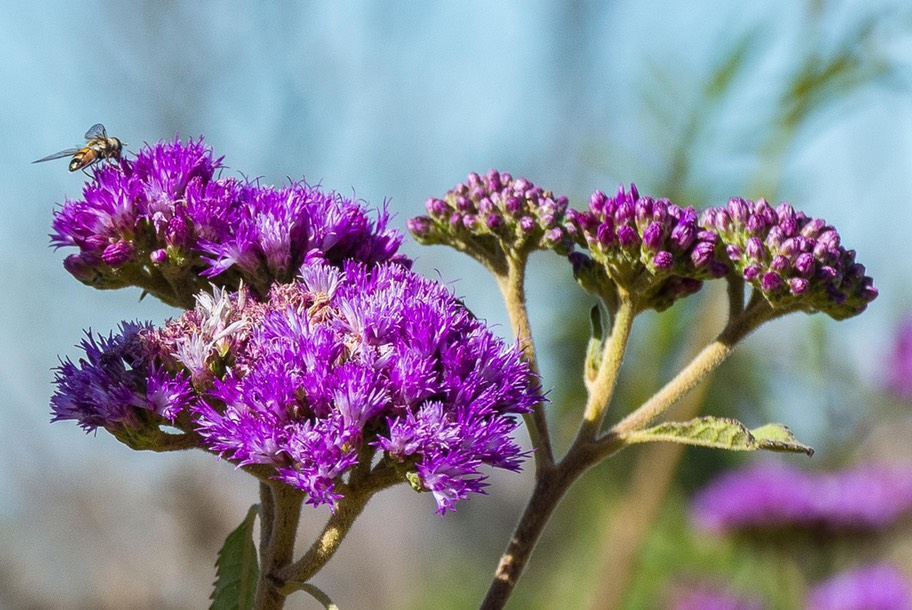
We were glad to return to Adios for a bit before heading further south to Mzuzu for some shopping. In Malawi we were finding that there are few places with actual stores, much less what we call a supermarket. Mzuzu was the first spot below Karonga, that town that was all shut down for demonstrations. That had been two hundred kilometers and many days ago. Mzuzu was great, an actual small city and regional center for a large part of Malawi. We were able to get to a pharmacy to replenish our malaria pill supply; and Rick finally got a SIM card from Airtel so we could get internet without having to rely on lodges we were camping at. We had rejoined the world!
By now we were anxious to get back to the lake, home of the quiet serenity and constant breezes we’d come to appreciate. So we trekked back to the main road going south (the M5), which rejoined the lake at Nkhata Bay. Our next stop was at Makuzi Beach Lodge, south of Chinteche.
And we could have stayed for weeks.
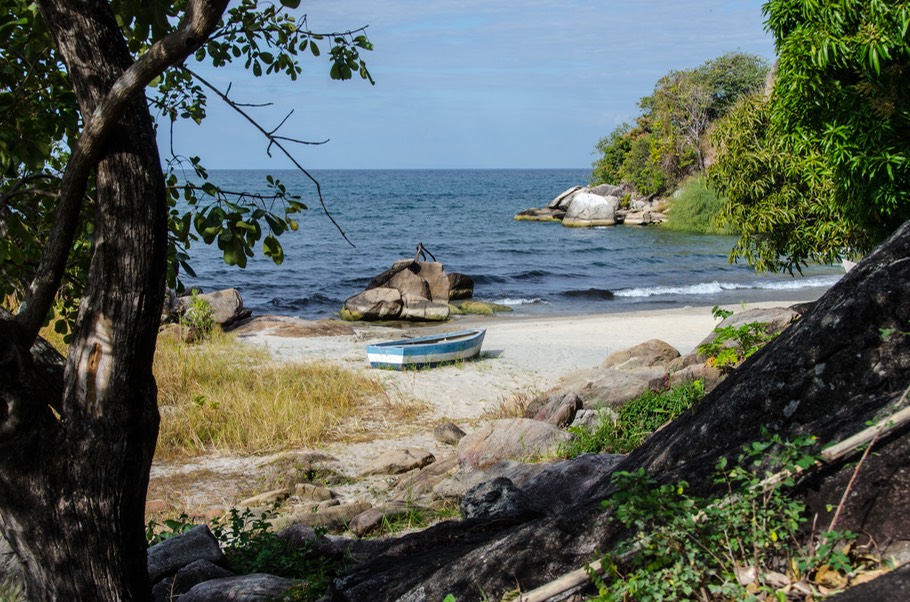
Makuzi Beach Lodge was our idea of perfection along the lake. It’s a privately-owned beach with chalets, a pretty little camping area near trees and next to the water and attractive stone buildings surrounded by grass and well kept landscaping. This is probably our favorite spot in all of Malawi. A little higher priced than some others, but not out of line; having eaten out a couple times in the past week we decided to stay out of the restaurant, but we really enjoyed our stay. You could take walks along the beach and play in the waves or just lay out in the sun.
We probably need to qualify our comment on cost. We’re not tightwads, but we’re pretty frugal because we need to be. Still, sometimes we think perhaps we should loosen up a little. Here we were, enjoying a lovely campsite along a beautiful lake, with warm sun and cool breezes, all the food and water we needed on hand for a good long stay, a bar and restaurant if we wanted with decks viewing the lake… for $20 US per night. Is it possible that we’ve become a tad spoiled by this itinerant life we lead?
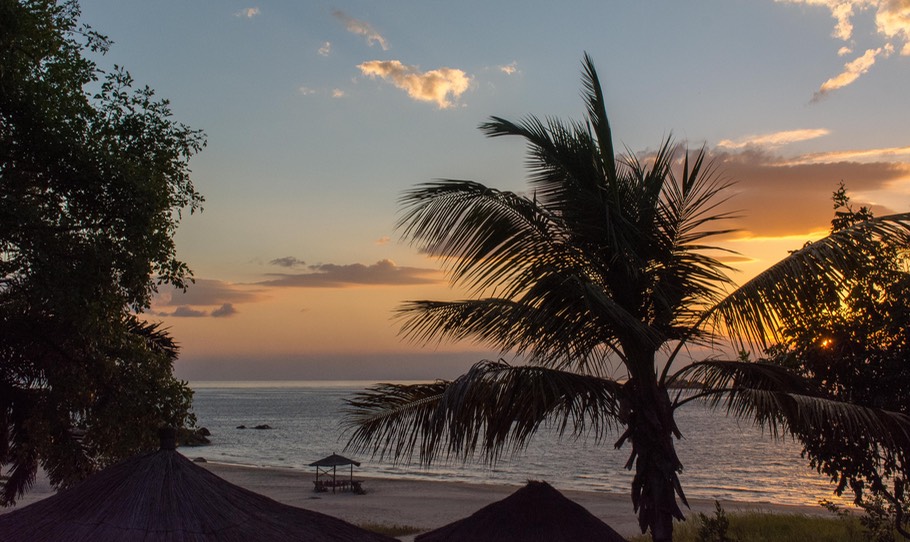
The owner was very nice, and Rick had an interesting chat with him one morning. He commented that things were quiet just now; he said he’d owned the lodge for twenty years and that things used to be much busier. He admitted that the quiet was kind of nice even though his income was less. When asked why Malawi was less expensive and less touristed than other African countries, he had some good insights. It pretty much began with the global recession in ’08. Tourism dropped way down at that time and then never fully recovered in Malawi for two main reasons.
First is that while two parks in Malawi claim to have the infamous Big 5 of African Safari Tourism — Elephant, Rhinoceros, Buffalo, Lion and Leopard — their numbers are quite small and actually getting to see them all is not as sure a thing here as in several other countries. Second is that it takes longer to get to Malawi; it is a bit out of the way. With more countries starting to follow the Japanese model (a maximum of two weeks of vacation at a time) he said, the longer travel time to come to Malawi causes lots of folks to opt for more popular and more easily reached destinations. With fewer fly-in safari tourists, there are naturally fewer tour operators, fewer feet on the ground so to speak, and all this results in lower prices. Perfect for independent travelers such as ourselves, and a major factor in Malawi’s attractiveness to overlanders.
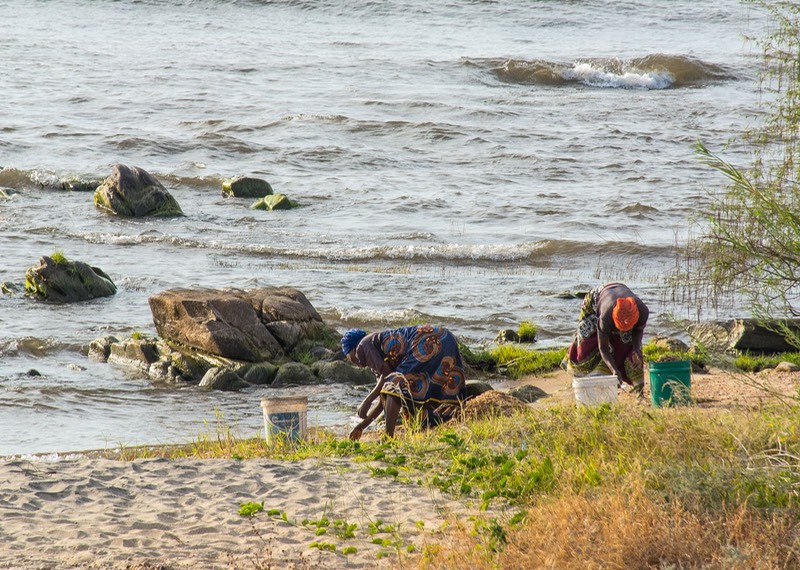
Reluctantly we eventually packed up and moved on down the lake, but not too far. We were headed for the Nkhotakota Pottery Lodge, an actual pottery factory which is right along the lake, and also a very nice spot to enjoy. They are quite well known for the quality of the pottery, and produce a full range of dishes, etc.; plus they have a nice showroom with textiles, books and stuff — all for sale. Prices seemed reasonable, but we have no place to put such things and so made do with a new coffee cup, which immediately became Kathy’s favorite.
The camping area is next to the water, and you can watch the women coming down in the early morning to gather the damp sand to bring back up to the pottery works. They go to the same spot each day, and dig around with their hands until what they are working with feels exactly right. Then they load up buckets which they (of course) put on their heads and walk off — think of what a five gallon paint bucket full of damp sand must weigh! This goes on for at least an hour before they, presumably, have gathered enough sand for the day’s work.
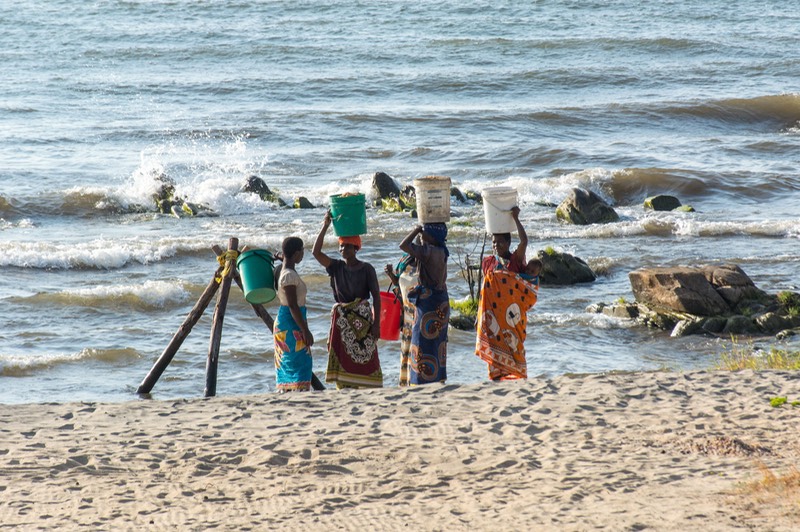
We were enjoying ourselves at the pottery place, but pretty soon we were going to run out of food again. Roadside produce is great, but the selection doesn’t include dairy products or meat that we are interested in. We needed to make a run into Lilongwe, the capital city, about 85 kilometers over the mountains to the west. But we had a bit of time left, and had one more place we wanted to visit before stocking up.
We kept on working our way south along Lake Malawi. The road shifted further inland to get beyond a headland, and then we joined the M14 for a short distance until we reached Kuti Wildlife Reserve. The owner back at Makuzi Beach had suggested we might enjoy this place, a quiet spot with (a) zebra sightings to die for, and (b) our first chance to see Sable antelope. This place doesn’t get a lot of attention; it’s small, there are no Big 5 sightings to be had, and there’s not a lot to do. But we were quite happy there for a couple of nights. We wandered, enjoying the Sable in particular — they are magnificent animals and usually too shy to really be able to get a good look. We found one fellow who kept his distance a bit but never turned to leave. We came back the next morning to where we’d found him… and he was still there. He was a charmer.
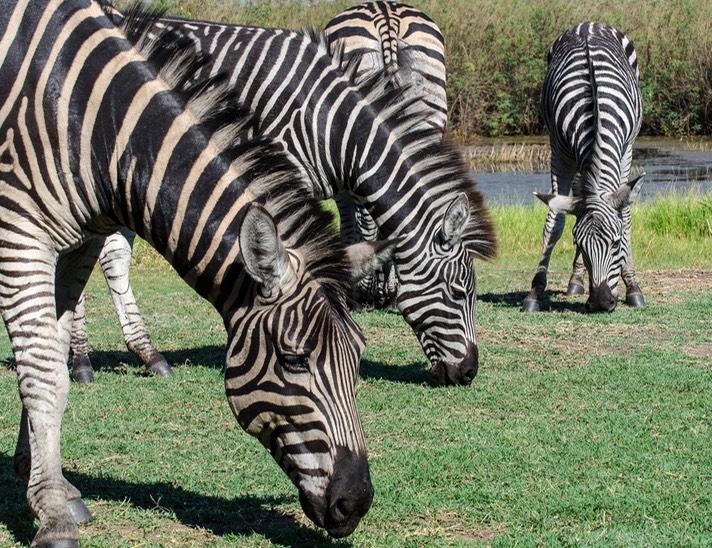
And then there were the zebras. There is a hide at Kuti called the Sunset Deck that looks out on a grassy spot beside the water and the zebra visit there every morning to mow the lawn. We arrived just as they did; they didn’t leave, and neither did we. We’d never been so close to them, and Rick had brought his telephoto lens thinking of the game being visible further away. We snapped and snapped (and later gave out with mutual moans at, “all those d _ _ n Zebra pictures).
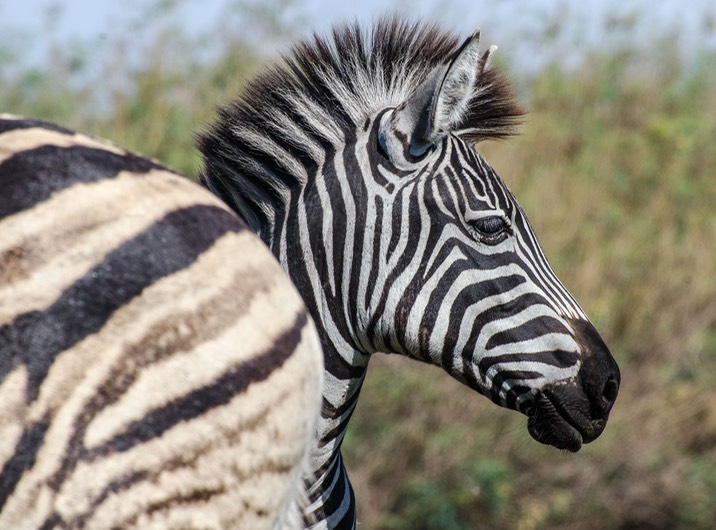
But for us it was a special morning; please go to the photo page to enjoy these beautiful animals.
Recently, after a full year in Africa seeing all types of game animals we were asked what our favorite was. Oddly enough, one of our top two or three was the Zebra. Who cares about a horse with stripes you might reasonably ask? Well, when seen in the wild, in large numbers, the stark contrast and endless variety of the pattern of their markings is just so evocative of Africa you simply never get tired of watching them. As an interesting sidebar, we had had a nice chat with a fellow we ran into there at Kuti. He was 20 probably, and there for a few weeks during the European summer, volunteering. His job was to keep track of the zebra population, making sure they were healthy, hadn’t been found by poachers, etc. Nice guy; he told us that a zebra foal can identify its mother by her stripes, by about the time it is 20 minutes old. Amazing.
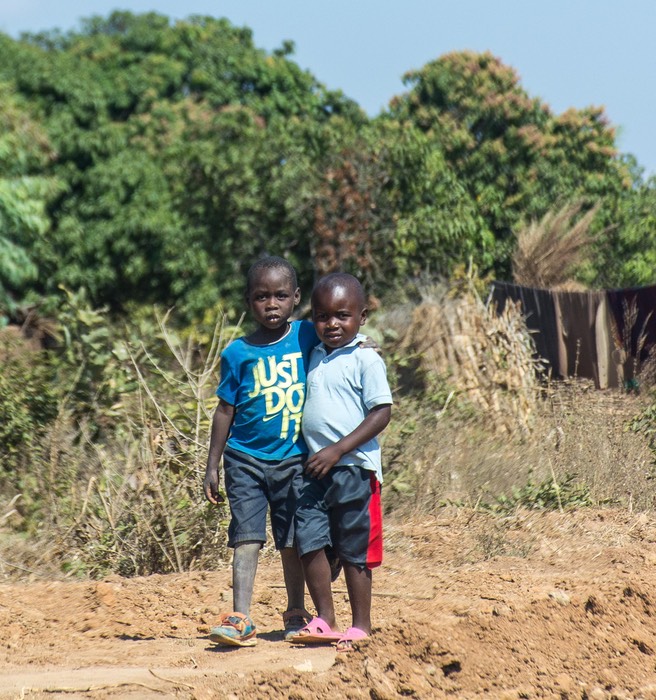
Eventually, we had to leave Kuti Wildlife Reserve — we were never in danger of starving to death, but having food around seemed like a good idea. So we started inland toward Lilongwe, about 85 kilometers to the west. We would be heading into the mountains to get there, which we were looking forward to. We’d been warned before coming into this country that there is a level of what we Americans would call smog that hovers over the entire land up to a certain elevation. It seems to us it comes from the regular burning that takes place most everywhere, and probably doesn’t disappear until the rains come. Some call it Malawi Murk; you can see it in many of our pictures. So heading for the hills would get us above that layer and give us a break.
But we weren’t through with Lake Malawi, and would head back there when chores were done. So stay with us for more lovely lakeside photos and adventures — there are wonderful people as well as crocodiles and elephants and hippos on down the road a bit!
Best wishes from Team Tortuga, all healthy and happy again!
Please go to the photo page for this story to see much more of Northern Malawi